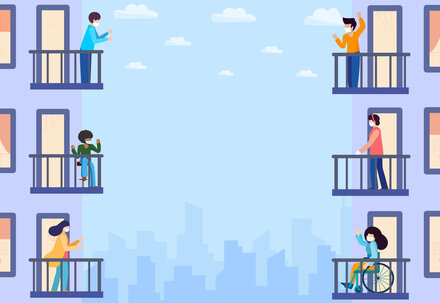
x
Andrew LaSalla
Andrew LaSalla II is one of the most trusted financial consultants in the residential and commercial lending business. With over seven years of of property loan underwriting experience, Andrew's sole focus is helping clients successfully navigate complex financial laws, terms, rules, paperwork, and transactions necessary to secure loans for new construction, purchase, or refinancing of multifamily, healthcare, affordable housing and student housing properties. Whether it's HUD, FHA, or MAP loans, Andrew is committed to tailoring financial solutions for every client he serves.
The early impacts of COVID-19 on multifamily apartments can be seen in the decline in multifamily permits for new construction. New permits and initial construction will likely also see a decline in the coming months, as developers wait for this time of economic uncertainty to pass, and states start to re-open different sectors of industry.
COVID-19 Impact on Multifamily Apartments for Low Income Families
Average rent is beginning to drop due to job losses and furloughed employees. The most significantly affected multifamily properties are those that serve lower income residents that have minimal savings or liquidity and tend to live paycheck to paycheck. If these individuals are unable to find work, they will fall behind on rent payments.
COVID-19 Impact on the Luxury Apartment Sector
The luxury apartment sector is also significantly affected by the coronavirus. Individuals that have above-average incomes which include 401k company matches, commissions, and large bonuses are seeing a reduction in income and will expect reduced year-end bonuses. Individuals that would normally upgrade to new projects with better amenities may instead downgrade to cheaper apartments with fewer amenities in light of reduced earnings this year.
COVID-19 Impact on Hospitality and Other Industries
Rental properties in areas such as Las Vegas and Miami are likely to be significantly impacted by the shelter in place orders and the loss of jobs caused by the coronavirus. These cities rely heavily on the tourism and hospitality industries, which will take a long time to recover from the current social distancing requirements and policies that are in effect in the majority of the United States.
Other industries that will be impacted most significantly include, retail, food services, entertainment and recreation. These industries employ a large portion of renters throughout the United States. Apartments in urban areas are home to many residents employed in these industries. These residents are at high risk of financial loss due to COVID-19. The impact of COVID-19 on these industries may have a significant effect on occupancy percentages and cause a decrease in income from rent in the near future.
Restrictions on Landlords
During this time, many renters are struggling to pay their rent, an unavoidable side effect of record high unemployment applicants – peaking over 23 million towards the end of April. Many local governments have announced moratoriums on landlords that prohibit the eviction of renters. Many landlords are also extending leases and deferring payments for those that are unable to cover their rent.
Keeping Older Residents Safe
Owners of multifamily apartments with a majority of tenants at age 65 are facing significant challenges in keeping their residents safe as this population is the most vulnerable to the coronavirus pandemic. These residents may need assistance to get medication and groceries while sheltering in place. Many of these individuals may not have internet or smartphones to easily keep in contact with family and friends. However, the recent rise in home delivery services is making it easier for the elderly to stay at home and avoid the risk associated with venturing out to grocery stores or supermarkets. Many multifamily apartment owners are finding solutions to protect older residents:
- Properties have increased cleaning protocols to mitigate the risk of spreading the virus through multifamily apartment living.
- Buildings have increased their spending on cleaning services and are sanitizing common areas several times daily.
- Several procedures have been put in place to limit visitors and enforce social distancing measures in apartment communities.
How to Invest in Your Property During COVID-19
With interest rates at historical lows, multifamily apartment owners are still benefiting in several ways by reducing their debt payments and using their increased cash flow to improve their current projects and take advantage of purchasing new projects to add to their portfolios.
Contact LSG Lending Advisors for financial advice relating to multifamily, healthcare, affordable, or student properties and assistance with loan application processes.